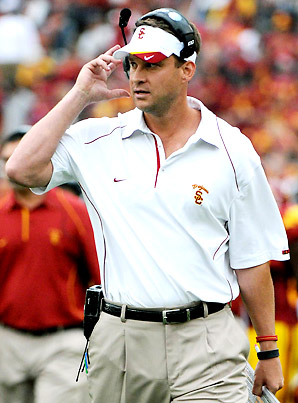The USC case sets a new standard; but will the NCAA uphold it?
In a raunchy coincidence, South Park turned its satirical cannons Wednesday on big-time college sports in general and on the NCAA in particular. (As the South Park disclaimer notes, you'll probably be offended. Don't click this link unless you accept that.) No doubt a few cardinal-and-gold-clad Los Angelenos caught the episode on Comedy Central and laughed to keep themselves from crying at the news that the NCAA had upheld all the penalties against USC's football program.
Was the NCAA's Infractions Appeals Committee fair in upholding the punishment assessed against USC for the largesse received by former Trojan Reggie Bush from two wannabe agents while still in school? At the moment, we don't know. But we will in the next year or so.
The IAC and the Committee on Infractions, which originally levied the penalties 11 months ago, have backed the NCAA into a corner now. By finally detonating the bomb they dropped on USC's program, they have sent a message that comparable future cases will be handled similarly. If the committees -- with membership that changes annually -- do apply the precedent they set with USC, they might just send a message to schools that cheating truly won't be tolerated. If they don't, then the NCAA will be guilty of exactly what Cartman's line implies: that the governing body of college sports, a many-headed hydra run by hundreds of schools with differing interests, is simply making everything up as it goes along.
USC got drilled for an extra-benefits case in which a player received great quantities of cash and goods from an outside source because of his notoriety. An assistant coach allegedly knew and did nothing about it. (Former USC assistant Todd McNair has denied this, and the NCAA's most compelling piece of evidence is a two-minute phone call between McNair and one of the would-be agents after Bush left USC.) In August, Ohio State will go before the COI in an extra-benefits case in which multiple players received lesser quantities of cash and goods from an outside source because of their notoriety. The head coach knew and did nothing about it. (No allegedly necessary here. The NCAA has smoking-gun e-mails, and coach Jim Tressel has admitted he hid the information from the proper authorities.) At some point in the not-too-distant future, the NCAA enforcement staff will wrap its investigation into North Carolina's football program. The Tar Heels face an extra-benefits case in which multiple players received cash and goods from an outside source (in this case, an agent or multiple agents) based on their notoriety. In this case, the associate head coach was a former employee of one of the suspected agents, and the NCAA will presume he knew and did nothing about it. It's entirely probable the NCAA will accuse former UNC assistant John Blake of acting as an agent runner.
So will the COI consider the precedent it set in the USC case when it adjudicates the Ohio State and North Carolina cases? Not if it follows NCAA guidelines. The organization recently launched a Web page designed to demystify the enforcement process. Among the nuggets is a section which concerns using precedent when assigning penalties.
"Each case is unique, and applying case precedent is difficult (if not impossible) because all cases are different," according to the Web page. "Each case has its own aggravating and mitigating factors, and the committee considers both sides in assessing penalties."
No two robberies are the same. No two Ponzi schemes are the same. No two DUI cases are the same. Yet every day, judges in real courts weigh precedents and try to find the most similar cases so they don't issue a sentence out of step with the sentences handed to those who committed similar crimes. Is it too much to ask that the NCAA give its member institutions the same kind of justice?
The COI set a new standard in the USC case. "Never before has the Committee so significantly punished an institution for not being able to detect and curb the clandestine actions of agents and runners acting only to promote their own interests," according to USC's appeal of the COI's decision, released Thursday by the school.
The appeal makes another excellent point. "Until the Committee's Report in this case, no institution, no matter how egregious its conduct, has ever suffered both a two-year postseason ban and a loss of 30 or more scholarships -- even for systematic and intentional violations involving an institution's coaches or staff," according to the appeal. "Moreover, before this case, the Committee had never reduced the total number of scholarships to 75 for a single year, much less three years."
USC officials argued that their program faced the most severe penalties handed down by the NCAA since SMU's football program received the Death Penalty in 1987. That is a matter of opinion -- Auburn's 1994 television ban was pretty harsh -- but the punishment handed to the Trojans certainly suggests the COI views USC's sins as serious crimes. The question now is whether the COI, with a membership that changes from case to case, will wield a similarly large hammer if it determines either of the two high-profile programs awaiting their day in court broke the same rules.
Did USC deserve the punishment it received? Maybe. We'll know just as soon as the punishments come down in the Ohio State and North Carolina cases.





